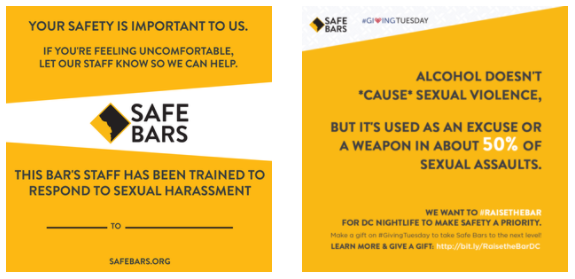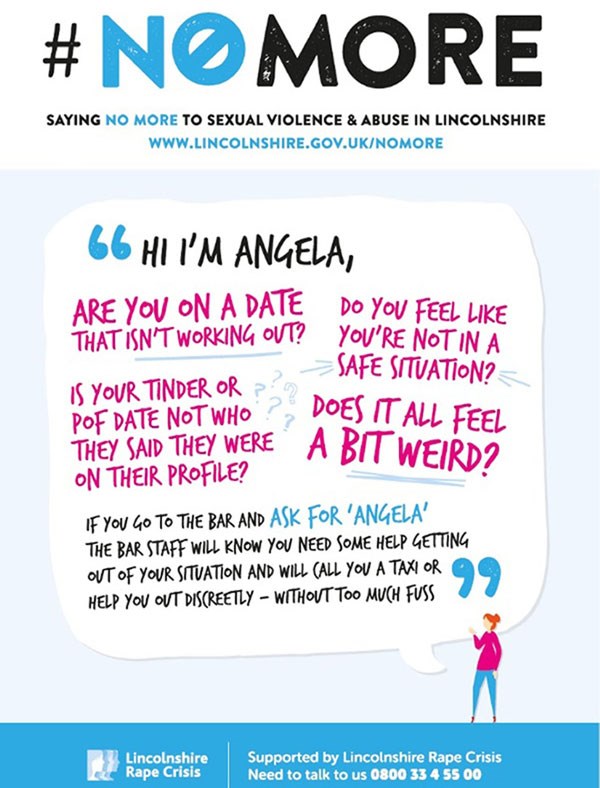Statistics show that instances of sexual assault in bars, clubs and pubs are on the rise. In London alone, reports of assaults more than doubled in the last year. A conservative estimate poses that one in four women will experience some form of sexual harassment or assault in their lifetime. About half of these attacks involve alcohol consumption.
Alcohol is not the root cause of sexual violence. It is, however, often used as a scapegoat, with perpetrators of the violence arguing about consent or culpability due to alcohol consumption. The increase of sexual violence in alcohol-serving venues has made it imperative for these venues to take a stance against these deplorable crimes.
We had a look at some initiatives that alcohol-serving venues are putting in place to prevent sexual violence, making patronage of their venues safer and more enjoyable for everyone.
Creating Safe Spaces
When venues make it clear that a zero tolerance policy towards any form of sexual harassment and assault is in place, all patrons feel safer and are given an equal opportunity to enjoy themselves freely – especially if they are drinking.
Sexual harassment and assault have become so rampant in bars, pubs and clubs that many in the most vulnerable groups have come to see it as an expected part of a night out. This has resulted in individuals avoiding certain venues and events that are deemed unsafe or uncomfortable, especially if intoxication is involved.
Sexual violence targets women and other vulnerable groups disproportionately, making alcohol-serving venues all the more dangerous for these groups if there is no sense that the venue is dedicated to ensuring everyone’s safety.
In response to the rise of sexual violence in alcohol-serving venues across the world, a number of initiatives has been implemented to make these venues safer spaces. The initiatives fall into two mains camps – staff training and patron empowerment.

Staff Training
Bystander training is being implemented in venues around the world to help staff recognize signs of a potentially dangerous situation before it arises.
Initiatives such as Safe Bars in the United States focus on training staff to read body language and subtle signs that someone may be feeling unsafe or uncomfortable, while simultaneously recognizing early signs of aggressive or dangerous behavior.
Staff are trained to feel empowered to intervene and handle these difficult situations safely and professionally, to remove the risk before it causes harm – based on the notion that bystander intervention is the key to preventing sexual violence.
The Victorian government is currently in the process of working out an Australian-first campaign to make live music venues safer places. After pressure from organizations such as SLAM and LISTEN to address the growing problem of sexual violence at live music events, the government has promised to fund a program that will work towards making these venues and events safer, especially for women. The training could become a mandatory condition of liquor licensing for venues.
Venues that can’t access the sort of training provided by Safe Bars and similar initiatives are encouraged to train their staff in practical tips for preventing sexual assault. The focus of this training should incorporate bystander intervention as well as the fundamentals of the responsible service of alcohol.
Patron Empowerment
A number of initiatives have kicked off in alcohol-serving venues that encourage patrons to seek help from staff if needed. These initiatives focus on giving patrons a safe means of letting staff know they are in an unsafe or uncomfortable situation, without putting themselves in danger.
In the UK, the ‘Ask for Angela’ campaign encouraged patrons to “ask for Angela” at the bar if they found themselves in an unsafe or uncomfortable situation. This code phrase alerted staff that intervention was needed to safely remove the customer.
Other venues around the world have implemented the ‘Angel Shot’ initiative to prevent sexual violence and make patrons feel safer. The ‘Angel Shot’ is a fictitious drink that can be ordered neat, with ice, or with lime, indicating the level of staff intervention needed: escorting the customer to their vehicle, calling a cab, or calling the police.
Some venues have put up signs visible to every patron, outlining the safe space policy in effect. Such signs can outline unacceptable behavior, help customers feel comfortable seeking help from staff, or encourage patrons to report incidents they have witnessed.
Melbourne’s Old Bar has put up a sign outlining that: “Any type of unwanted touching or groping is sexual assault. If you're accused of doing this at the Old Bar you will be restrained by security until police arrive and you will be charged."

Looking Forward
Alcohol is not the root cause of sexual violence, but it is too often a factor. While broader education and cultural shifts will ultimately be needed to reduce sexual violence, it is crucial now that venues where sexual harassment and assault are prevalent become proactive in helping to reduce these crimes.
The onus is on venues to become safer spaces for everyone to enjoy alcohol responsibly and without worries – by training staff to be alert, encouraging patrons to seek help if needed, and making it clear to everyone in the venue that a zero tolerance policy is in place towards dangerous and aggressive behaviour.
If you or someone you know is impacted by sexual assault call 1800RESPECT on 1800 737 732 or visit 1800RESPECT.org.au. In an emergency, call 000.
 |
Ivana Rnjak is a Production Researcher and Content Writer at Typsy. A waitress and bartender in a previous life, Ivana is an aspiring academic with an unwavering love of brunch – no matter what Anthony Bourdain says! |
You Might Also Like